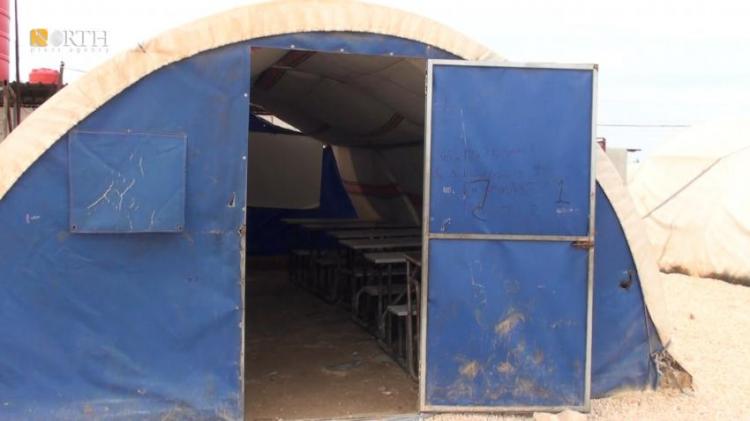Northern Aleppo countryside – North-Press Agency
Dejla Khalil
Afrin IDP students in the northern countryside of Aleppo in northern Syria recently complained about their inability to benefit from distance learning projects via video, television, and the internet, because of the lack of means to complete their education in this manner.
At the beginning of this month, the Education Authority of the Autonomous Administration of North and East Syria approved an educational plan to ensure that students receive the curriculum, and to avoid negative influences following the decision to lockdown all educational centers as a preventative measure against the outbreak of coronavirus on the 14th of March.
Khadija Ali, a 23-year-old university student residing in the refugee camps in the Afrin region in the northern countryside of Aleppo, told North-Press that the distance learning method does not work for her and the other displaced students.
"I do not have a television to watch, and even if I did, the hours which electricity is available are irregular, and I do not have a fast-enough internet connection to be able to attend lectures that are published through social media."
On March 23rd, the Crisis Management Team in the Autonomous Administration of the Afrin region, agreed to provide camps and villages in the northern countryside of Aleppo with additional hours of electricity during the day, from 12 PM to 2 PM, and from 6 PM until 12 midnight.
Zinareen Tari, a high school student residing in the same camp, expressed her fear of not continuing her education due to the events that she and her generation witnessed, starting with their displacement from Afrin: "I am concerned that my education will be interrupted due to the school closure, our inability to complete the curriculum, and our ignorance of how to take the exams, because I do not want to lose my future and my ambition in studying."
Regarding the negative effects of the repeated interruptions in the educational process on students and teachers, Hanan Muhammad, a psychological and educational counselor at a school in the "Sardem" camp in the village of Lusin in the northern countryside of Aleppo, said: "It is not the first time that students have dropped out of school. Education was interrupted during Turkey’s war on Afrin and then the displacement of its students and their families, in addition to the interruption caused by the almost constant shelling in the villages of the Sherawa District and Tal Rifaat, so that the quarantine made matters worse.”
She added that all of this was a reason that “the students lost their education systematically, and it affected their levels of educational attainment, in addition to the previous effects of war and displacement."
In a phone call with the Education Authority of the Autonomous Administration, Berivan Khalil, co-chair of the authority, told North-Press that the authority is conducting a study to find emergency solutions on how to compensate students' lessons in different regions, as well as how to provide exams if they continue the ban longer than the prescribed period.

